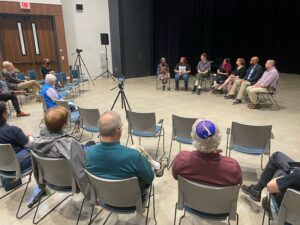By Lee Chottiner
Community Editor

In the first public program to be held at the Trager Family JCC, a panel of students and teachers, moderated by WFPL reporters, made a frank appraisal of how Black history is or is not taught in Kentucky schools today, while comparing its status with how the Holocaust is taught in German schools. (photo by Rachel Firkins)
As a panel of students, teachers and journalists dissected how Kentucky and German schools treat the subject of hate, one thing became clear: Student discomfort in the classroom was a major issue.
Just how much should Kentucky kids be exposed to the history of racism here? How should the Holocaust be broached to German children?
And how comfortable should students be in both lands when tackling the ugly side of their pasts?
The panel dealt with all these questions during an April 20 program, “A Critical Moment: A Conversation with Jewish Louisville,” sponsored by the Jewish Heritage Fund, Jewish Federation of Louisville and 89.3 WFPL. It was the first event at the Trager Family JCC since its opening on April 18.
Moderated by WFPL reporters Stephanie Wolf and Jess Clark, the program was based upon a recent documentary Wolf and Clark recorded for WFPL. Clark covered the Kentucky angle from Frankfort while Wolf traveled to Germany.
Teachers in both lands face major challenges addressing what Wolf called “their painful pasts.”
In Germany, even though a Holocaust studies curriculum is required in each state, critics contend that teachers do not get adequate training and must do their jobs amid a backdrop of spiking extremism, antisemitic crimes and continued claims in some quarters that the Holocaust didn’t happen.
Still, most officials acknowledge that Germany’s crime against humanity must be faced, Wolf said. She spoke to one official in the German state of Bavaria who believes discomfort is critical to teaching the dark side of his country’s history.
Many Kentucky lawmakers disagree, having just passed, over Governor Andy Beshear’s veto, an anti-critical race theory bill, which could discourage state teachers from fully addressing racism or connecting it to present day race issues.
Kentucky now joins a growing number of states that have passed laws suppressing the teaching of race, sex and transgender issues.
Lawmakers say they are not suppressing these subjects, merely protecting children who shouldn’t be made to feel uncomfortable.
But Black high school students on the April 20 panel were vexed by this thinking.
“I think the bill is crazy,” said Lorraine Griffin, a junior at Louisville Male High School. “In my school, my whole life, all we talked about was white history. We never talked about Black history.”
Kumar Rashad, a Black panelist and a teacher at Breckenridge Metropolitan High School, said Black children have always felt uncomfortable in schools that don’t teach their history in a country that has made their history “illegal” since the days of the slave trade.
When lawmakers cite discomfort of children for stifling classroom discussion, Rashad said, they only want to protect white children … and white supremacy.
Keith Meador, a Holocaust studies teacher at Central High School, said there is value in children from different backgrounds learning about the struggles of other groups.
For example, he said, the Central student body is more than 90 percent Black, with no Jewish students. Yet they study the Holocaust.
When Meador teaches American history, he said, he sometimes swaps the word “nativism” for “racism” to get his students thinking in different ways about hatred affecting many groups. In Louisville, he noted, more than 100 people were killed in rioting in the 1840s merely because they were Catholics.
“That’s my job as a teacher, to make them (the students) different when they leave me in May as when they came in August,” Meador said. “There has to be some type of push.”
When the program was opened to the audience for comments, one man agreed generally with the panelists, though he disagreed with making children uncomfortable in class.
A woman who used to teach history said she couldn’t imagine teaching the course today in the current climate.
Another woman professed astonishment at lawmakers who suppress the teaching of history.
“If you don’t teach history,” she said, “it comes right around again.”
And several audience members said they were taught little, if anything, about race and the Holocaust in their own schooling. One man said he knew little about what happened in Europe until he grew up and went to work in a bank.
There, he met a man with numbers tattooed on his arm, he said.


